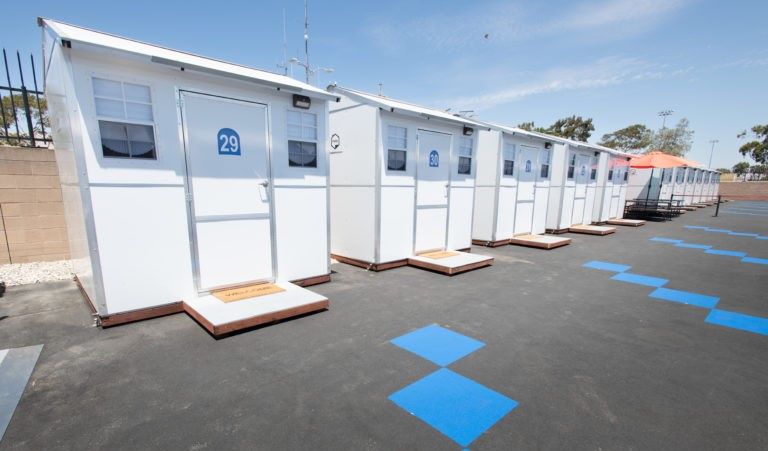The Los Angeles City Council approved more than $8,000,000 in additional funding for interim housing services in the city at its meeting Tuesday. The motion was meant to address years of funding issues that the interim housing contractors the city has agreements with have had in operating these houses.
With its partners facing financial issues with Los Angeles Interim Housing units, the city council ordered a study on the costs of operating these interim housing units in October 2022. Conducted by a firm picked by the Los Angeles Housing Authority and completed last August, the study concluded that the current bed rates — the rate that the city pays a provider for each bed per night — needed to be increased by at least 10 percent to meet the operating costs of these units.
There are a variety of interim housing solutions that will be impacted by this rate change, including Project Homekey, A Bridge Home, and Tiny Home Villages, among others. Many of these programs require 24-hour operation with specialized staffing and case management services, which has put a significant financial burden on its operators.
Over 6,000 beds are supported by interim housing providers contracted with the city of Los Angeles, and the current $134,293,273 allocated for these contracts — which is about $61.26 per bed this fiscal year. Several options for interim housing were given a 10 percent increase, but many received a slightly larger bump.
Single occupancy crisis housing received the greatest increase, as the bed rate was increased from $40 to $60, a 50 percent increase. Rates for overnight safe parking spots, bridge housing, and the Winter Shelter Program were increased by $10, coming out to a rate of $60 for the Winter Shelter Program and Bridge Housing and $40 for overnight safe parking.
Many options did receive the baseline 10 percent increase including Project Homekey, which will simply apply a 10 percent increase to the various rates being paid through the program. Other crisis housing options for motels had their set rate raised by 10 percent from $105 to $115.50, and that 10 percent rise was also seen in other crisis housing sites — now at a $99 bed rate — the Tiny Home Village units that the city will pay $60.50 per unit per night to operate, and transitional housing units with a new bed rate of $77.
The $8,358,071 that is projected to be spent as a result of these changes would only apply for the final six months of the fiscal year — retroactively applying January 1 and lasting until the end of the fiscal year on June 30 — is an increase of 6.2 percent across the entire network of housing options.
This investment is not expected to entirely alleviate the financial issues that these providers have, but will provide noticeable relief according to the City Administrative Office’s report on the matter. A timeline for the development of this formula will also be passed as a part of the motion.
Councilmember Hugo Soto-Martinez presented an amendment to the motion enacting these changes before the vote at Tuesday’s meeting that focused on the development of this formula. The amendment inserted by the councilmember mandates the inclusion of a cost analysis of funding these projects to a point where its workers can be paid $25 an hour.
The report notes that one of the issues interim housing operators face is tied to an inability to pay competitive wages to hire and retain the specialized workers needed to run the sites. Other issues noted in the report include needing support with the many data and reporting requirements placed upon them, as well as needing funding to address maintenance needs.
The source of funding for this increase will also be identified as part of the motion and could come from the city’s General Fund. Once funding is identified, the requests for contract amendments will be made.
Photo courtesy of L.A. County
Stay informed. Sign up for The Westside Voice Newsletter
By clicking submit, you agree to share your email address with Westside Voice. We do not sell or share your information with anyone.








